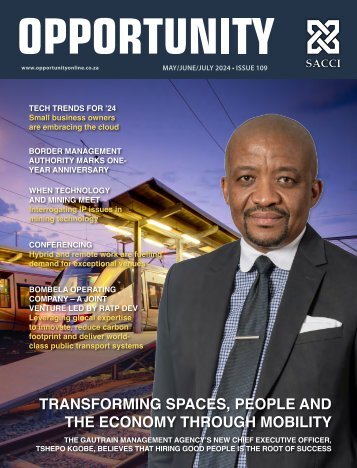South African Business 2016 edition
- Text
- Investment
- Government
- Business
- Development
- Network
- Sectors
- Investing
- Business
- Africa
- African
- Economic
- Manufacturing
- Mining
- Opportunities
- Economy
- Overview
OVERVIEW Information and
OVERVIEW Information and communications technology ICT spend is on the increase nationwide. Government is leading the charge in ICT spending. According to a new Frost & Sullivan report‚ titled ‘ICT Spend in South Africa: Public Sector’‚ the public sector saw an ICT spend of 5.9m in 2014 and they estimates this will reach 7.6m in 2019. Managed services and fixed and non-cellular connectivity accounted for 73.1% of these investments. According to Frost & Sullivan ICT Industry Analyst Naila Govan- Vassen, the development and uptake of eGovernment services will be driven by South Africa’s National Development Plan‚ the National Integrated ICT Policy Green Paper‚ and the Broadband Policy are expected to drive. “ICT spend will centre around updating IT hardware and data centres and on supporting systems integration‚ especially within the health‚ education and administrative departments,” said Govan-Vassen. Current expenditure at present is limited to day-to-day ICT requirements across national and provincial departments. Creating a fully digital government is challenged by: • Legacy systems necessitating upgrades. • Limited infrastructure to connect all public sector buildings. • Lack of a coordinated plan to enforce ICT standards and ensure interoperability within national and provincial departments. • Security concerns surrounding shared and cloud computing. • Shortage of skilled resources. • Limited Internet reach and citizen access to online content‚ preventing twoway interaction with the government. About two-thirds of South Africa’s ICT companies are located in Gauteng Province. The ICT sector has about 200 000 employees working for 6 500 companies and contributes 6.4% to national GDP (Wesgro). The sector contains a diverse range of hardware manufacturing, software design and various service offerings such as software management, systems programming and technical support. South Africa is highly regarded as a centre of software development and offers attractive inward investment opportunities, especially in: • Automotive electronic systems • Access control and security • Financial sector • Silicon processing for fibre optics • Integrated circuits and solar cells The combined ICT market in South Africa is estimated to be in the region of R60-billion. Spending on ICT is predicted to rise to R120-billion by 2016. (Continued on page 120) SOUTH AFRICAN BUSINESS 2016 118
FOCUS MTN plugs R1.2-billion into KZN network MTN is spending billions of rands in upgrading its network and infrastructure. MTN, the second-largest mobile operator in South Africa, is targeting an extensive fi bre rollout that will stretch to more than 1100km and which will service in excess of 36 000 houses within 1 080 residential estates and suburbs. It will also encompass more than 300 shopping centres, malls and business parks. The fi bre rollout and multi-tiered service offering applies equally to enterprise end-users as it does to home and SMME users, providing access to high-speed Internet Access and value-added or over the top services that traditional medium such as DSL struggle to deliver. Alpheus Mangale The rollout started in 2015 and MTN anticipates that it will be completed in 2017. Rolling out fi bre-to-the-home (FTTH) is seen as a vital step in building a world-class infrastructure to enable local businesses to operate on a world-class level, especially considering the national government’s drive to support SMMEs, entrepreneurs and local innovators. FTTH is capable of delivering speeds of up to 100 Mbps and, in support of the government’s drive, MTN have already rolled out FTTH to the Western Cape, which represents the fi rst expansion of its high-speed network outside of the country’s economic hub, Gauteng. Many in the industry view fi bre as the new frontier, and it is an area that the leading players in the industry all see as important to invest in. MTN has stated that their initial FTTH rollout will focus on “high-density urban areas, such as high-end gated communities, boomed-off suburbs, and high-rise buildings”. The scenic La Lucia suburb in KwaZulu-Natal is one of the fi rst in the region that will receive the service, with Umhlanga, Kloof, Berea West and Durban North also slated for FTTH. The civil works are well underway report MTN, whose South African subscriber base alone is just under 30 000. The company has already committed a total of R10-billion rand for increasing its coverage and capacity for its 2G and 3G clients, in addition to improving its long-term evolution technologies. MTN Business SA chief enterprise offi cer Alpheus Mangale has assured local residents as well as subscribers that the telecoms giant is “working tirelessly to resolve all outstanding issues to the satisfaction of all concerned”. 119 SOUTH AFRICAN BUSINESS 2016
- Page 1:
SOUTH AFRICAN BUSINESS 2016 EDITION
- Page 6:
CONTENTS Introduction CONTENTS Sout
- Page 10 and 11:
CREDITS Publisher Chris Whales Publ
- Page 12 and 13:
SPECIAL FEATURE South Africa A peri
- Page 14 and 15:
SPECIAL FEATURE In a year that saw
- Page 16 and 17:
SPECIAL FEATURE owes its existence
- Page 18 and 19:
SPECIAL FEATURE against water losse
- Page 20 and 21:
SPECIAL FEATURE Operation Phakisa h
- Page 22 and 23:
SPECIAL FEATURE late in 2014. The h
- Page 24 and 25:
SPECIAL FEATURE Understanding Afric
- Page 26 and 27:
INTERVIEW Job creation on track Ala
- Page 28 and 29:
SPECIAL FEATURE Business funding Th
- Page 30 and 31:
SPECIAL FEATURE in turn makes it ve
- Page 32 and 33:
SPECIAL FEATURE Contact: 012 394 18
- Page 34 and 35:
SPECIAL FEATURE Black Business Supp
- Page 36 and 37:
SPECIAL FEATURE The evolution of sk
- Page 38:
SPECIAL FEATURE providing TVET lear
- Page 42:
PROFILE FP&M Seta Facilitating and
- Page 45 and 46:
• The development of a national s
- Page 48 and 49:
FOCUS Champions of change Five dyna
- Page 50 and 51:
SPECIAL FEATURE The top law firms S
- Page 52 and 53:
SPECIAL FEATURE Keeping the BRICS t
- Page 54 and 55:
SPECIAL FEATURE Keeping BEPS in che
- Page 56 and 57:
SPECIAL FEATURE IPAP in action In 2
- Page 58 and 59:
FOCUS THERE’S NO END TO THE BENEF
- Page 60 and 61:
INTERVIEW The riches of Africa awai
- Page 62 and 63:
INTERVIEW and it could actually be
- Page 64 and 65:
PROFILE ECIC exco profiles Profiles
- Page 66 and 67:
INTERVIEW The hub of Africa Tim Har
- Page 69 and 70: Key sectors Overview of the main ec
- Page 71 and 72: OVERVIEW from the subsistence farme
- Page 73 and 74: OVERVIEW South Africa produces abou
- Page 75 and 76: South Africa’s looming energy gap
- Page 77 and 78: How will these resources be develop
- Page 79 and 80: Vall exclusive economic zone limits
- Page 82 and 83: OVERVIEW NEED PIC Mining The South
- Page 84 and 85: OVERVIEW Mineral beneficiation The
- Page 86 and 87: PROFILE The Council for Geoscience
- Page 88 and 89: OVERVIEW Energy The South African e
- Page 90 and 91: INTERVIEW Cummins South Africa Cumm
- Page 92 and 93: OVERVIEW Manufacturing Increasing m
- Page 94 and 95: OVERVIEW Automotive International i
- Page 96 and 97: OVERVIEW Automotive components Incu
- Page 98 and 99: OVERVIEW Chemicals and pharmaceutic
- Page 100 and 101: OVERVIEW Healthcare South Africa’
- Page 102 and 103: OVERVIEW Water Severe water restric
- Page 104: OVERVIEW Improving quality The intr
- Page 107 and 108: Our Vision is is “Quality water f
- Page 109 and 110: OVERVIEW 107 SOUTH AFRICAN BUSINESS
- Page 111 and 112: OVERVIEW airports in India and Braz
- Page 113 and 114: affords, while maintaining its envi
- Page 115 and 116: kets, except Australia. In Africa,
- Page 117 and 118: Rosebank, Johannesburg, renamed ‘
- Page 119: Trade with Africa Improved infrastr
- Page 123 and 124: MTN rolls out fibre infrastructure
- Page 125 and 126: OVERVIEW community engagement. The
- Page 127 and 128: PROFILE For BEE Verification and is
- Page 129 and 130: OVERVIEW attracting and retaining c
- Page 131 and 132: OVERVIEW Small business is taken ve
- Page 133 and 134: Franchise Fund—an innovative plat
- Page 135 and 136: educating young people in fields th
- Page 137 and 138: OVERVIEW Management Plan has divert
- Page 139 and 140: hazardous waste is also not being c
- Page 141 and 142: INTERVIEW yourself up as a Tier 1 o
- Page 144 and 145: OVERVIEW Renewable energy South Afr
- Page 146 and 147: INTERVIEW Plenty of scope for solar
- Page 148 and 149: LISTINGS South African business org
- Page 150 and 151: LISTINGS South African National Gov
- Page 152 and 153: LISTINGS Department of Communicatio
- Page 154 and 155: LISTINGS Department of Human Settle
- Page 156 and 157: LISTINGS Department of Science and
- Page 158 and 159: OVERVIEW Regional overview: Eastern
- Page 162 and 163: INTERVIEW Buffalo City on the rise
- Page 164 and 165: OVERVIEW Regional overview: Free St
- Page 166 and 167: OVERVIEW Regional overview: Gauteng
- Page 168 and 169: FOCUS A Catalyst for Economic Devel
- Page 170 and 171:
FOCUS business people and tourists
- Page 172 and 173:
OVERVIEW Regional overview: KwaZulu
- Page 174 and 175:
OVERVIEW Regional overview: Limpopo
- Page 176 and 177:
OVERVIEW Regional overview: Mpumala
- Page 178 and 179:
The powerhouse of Africa Mpumalanga
- Page 180 and 181:
Mpumalanga: Key Sectors Mpumalanga
- Page 182 and 183:
Nkomazi Special Economic Zone The N
- Page 184 and 185:
INVEST IN THE PROVINCE OF THE RISIN
- Page 186 and 187:
OVERVIEW Regional overview: Norther
- Page 188 and 189:
OVERVIEW Regional overview: North W
- Page 190 and 191:
OVERVIEW Regional overview: Western
- Page 192 and 193:
FOCUS Khayelitsha - the power of to
- Page 194 and 195:
INDEX INDEX Abeco Tanks ...........
- Page 196:
ENSafrica.com ENSafrica | Africa’
Inappropriate
Loading...
Mail this publication
Loading...
Embed
Loading...






















































































































































